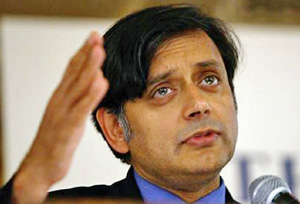New Delhi, Jan 20: Congress leader Shashi Tharoor admitted to "marital trouble" during his four-hour questioning by the Delhi police on the alleged murder of his wife Sunanda Pushkar, who was found dead in a five-star hotel in Delhi a year ago.
Sources say Mr Tharoor was calm during his questioning at a police station in south Delhi on Monday evening. He was reportedly asked over 50 questions by a team of four officers in the first of a likely three rounds of interrogation.
"We spoke to Shashi Tharoor about the background, what happened on that day and certain things said in the media. He was cooperative," Delhi Police chief BS Bassi told reporters on Tuesday and said more people would be questioned.
"We will analyse his response and decide whether any further questioning is required," he added.
Mr Tharoor "answered most questions" and did admit to some extent that there was marital trouble, said sources. A year ago, just after the death, he had told investigators that there were "misunderstandings" but he and Sunanda had a largely happy marriage.
The police have said Mr Tharoor is a witness, not a suspect. Asked whether he was still a witness, Mr Bassi said, "We are examining it with an open mind."
On January 6, the police launched a murder inquiry after stating that Ms Pushkar who was 51, was poisoned, but did not name a suspect. Mr Tharoor said that he was "stunned" to discover the police believe she was killed.
The police have questioned several friends, aides and staff members of the Tharoors, who married in 2010, and wants to match their version with his, sources say.
Mr Tharoor was a union minister in the previous Manmohan Singh government when Ms Pushkar publicly accused him of having an affair with a Pakistani journalist. Two days later, she was found dead in her bed in the hotel suite that the couple had checked into.
Earlier this month, Mr Tharoor had said that the investigation must be "free of political pressure or a predetermined outcome."






Comments
Add new comment